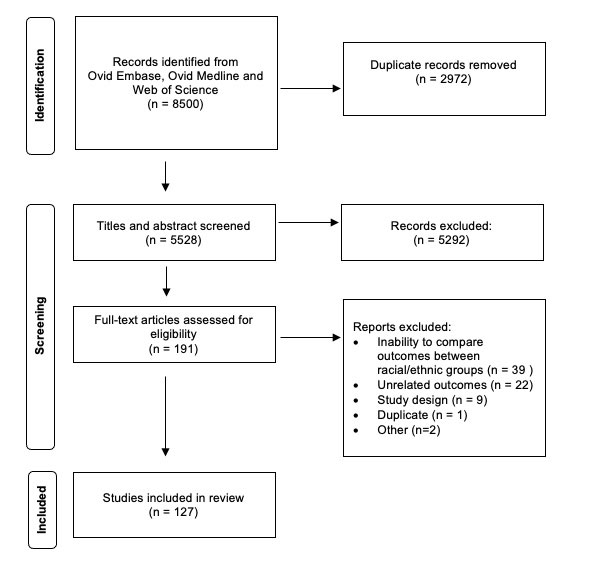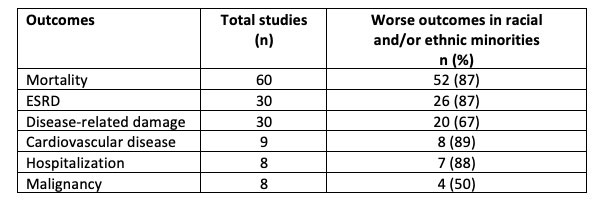Session Information
Session Type: Poster Session A
Session Time: 1:00PM-3:00PM
Background/Purpose: Racialized patients and ethnic minorities have worse outcomes in SLE. This is likely related to a complex interplay between genetic and non-genetic factors. Numerous studies have examined racial and ethnic disparities in SLE, with no comprehensive summary of disease-related outcomes and health care utilization among these patients. The objective of this study is to perform a systematic review describing racial and ethnic disparities in the following disease-related outcomes among adult patients with SLE: (1) mortality, (2) end-stage renal disease (ESRD), (3) disease-related damage, (4) cardiovascular disease, (5) malignancy, and (6) hospital utilization.
Methods: The systematic review protocol was registered with PROSPERO. A systematic search of the scientific literature was performed using three databases (OVID Embase, OVID Medline and Web of Science) to obtain articles published before October 2021. Search terms included the outcomes of interest (i.e., mortality, ESRD, disease-related damage, cardiovascular disease, malignancy and hospital utilization) and variations of terms used to describe racial and ethnic groups (e.g., White, Black, Asian, Hispanic, Indigenous). Longitudinal observational studies with a minimum of two years of follow-up were included. Case series, systemic reviews, and interventional studies were excluded. Screening of titles, abstracts and full-text articles were performed in duplicate by four independent reviewers (TS, KP, KZ, RA). Data extraction and synthesis were performed.
Results: The systematic literature search yielded 5528 titles and abstracts, of which 191 studies were selected for full-text review. Further review yielded 127 studies for inclusion (Figure 1). The majority of studies were conducted in North America (n=99), followed by Europe (n=16), Australia (n=7), Africa (n=6), Asia (n=6) and South America (n=3). Racial and ethnic groups identified include Whites (n=122), Blacks (n=133), Asians (n=51), Indigenous peoples (n=20), Hispanics (n=48) and others (n=6).
A total of 102 studies (80%) reported worse outcomes among racial and ethnic minority groups. Disparities were most commonly identified in studies describing outcomes among Black (n=93) and Hispanic (n=37) patients. Most studies reported outcomes related to mortality (n=60), with 52 (87%) reporting worse outcomes among racialized groups. Of 30 studies reporting on the development of ESRD, 26 (87%) identified racial and ethnic disparities. Worse outcomes were also reported among studies examining disease-related damage (n=30), cardiovascular disease (n=9), hospitalization (n=8), and malignancy (n=8) (Table 1).
Conclusion: This comprehensive review highlights the higher reported rates of mortality, ESRD, disease-related damage, cardiovascular disease, malignancy and hospitalization, among racial and ethnic minority patients with SLE. In the absence of a biological explanation for these difference, it is prudent to identify and address systemic causes for these outcomes. A meta-analysis of these outcomes is currently underway.
To cite this abstract in AMA style:
Semalulu T, Pasumarthi K, Zhao K, AlDhaheri R, Akbar N, BEATTIE K, TSELIOS K. A Systematic Review of Racial and Ethnic Disparities in Disease Related Outcomes Among Patients with SLE [abstract]. Arthritis Rheumatol. 2022; 74 (suppl 9). https://acrabstracts.org/abstract/a-systematic-review-of-racial-and-ethnic-disparities-in-disease-related-outcomes-among-patients-with-sle/. Accessed .« Back to ACR Convergence 2022
ACR Meeting Abstracts - https://acrabstracts.org/abstract/a-systematic-review-of-racial-and-ethnic-disparities-in-disease-related-outcomes-among-patients-with-sle/


